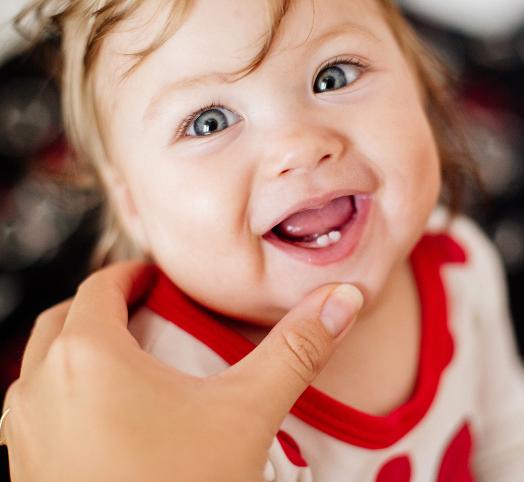Teething
Updated on March 2, 2023
Created on July 17, 2019
AU & NZ - Find your nearest pharmacy here
Updated on March 2, 2023
Created on July 17, 2019

Introduction
Your baby's first tooth can be a very moving experience. But it's not always easy for the child! Pain, bad moods and red buttocks… teething brings with it numerous little headaches that complicate life for your baby.
The first tooth usually comes through at around 6 months. But for some children, the first tooth can appear at only 4 months. And in some exceptional cases, babies are born with teeth. At the other end of the scale, some babies still don't have teeth even after 12 months. This is not necessarily an indication of poor development (provided it is not accompanied by any other anomalies). Be patient. When your baby starts to bite hard on his toys, suck his finger incessantly and dribble abundantly, it means his first tooth is close to coming through!
Teething calendar
The teeth do not appear in the same order in all babies. However, more often than not, they appear in the following fashion :
Between 6 and 10 months : the lower central incisors.
Between 8 and 12 months : the upper central incisors.
Between 9 and 13 months : the upper and lower lateral incisors.
Between 10 and 16 months : the first premolars
Between 16 and 20 months : the eye teeth
Between 20 and 30 months : the second premolars
Hence, between 2 and a half and 3 years, your child should have all 20 of his deciduous teeth. He is thus set until around 6 years of age when his delightful little baby teeth will begin to fall out to leave enough space for his permanent teeth.
Minor aliments combined with teething
When a tooth begins to erupt there is a certain amount of painful gum inflammation beforehand. Teething can also be accompanied by a whole range of minor problems which, while they are not serious, they can be unpleasant for your baby :
Swollen and sensitive gums
Hypersalivation
Hot red cheek (or cheeks)
Bad mood: your child is more irritable than usual and cries more easily
Sore bottom
Irritation around the mouth
Slight fever (under 38°)
Accelerated intestinal transit and more irritant stools
Unaccustomed waking-up during the night
Increased sensitivity to viruses and microbes, which may lead to a cold, ear infection or eye irritation, etc.
Temporary lack of appetite
Be careful, however, do not blame teething for everything : while these ailments are associated with teething, all these symptoms should ease within 48 hours. A high fever, genuine diarrhoea, vomiting or a pasty grey complexion should not be attributed to teething : if you are in doubt go and see your doctor.
To relieve your baby
Offer him a teething ring which he can bite into whenever he feels the need.
Some of them can be put in the refrigerator and preserve the cold which has a slightly anaesthetising effect.
Your doctor may prescribe a soothing balm for massaging your baby's gums with or even a homoeopathic preparation.
In the event of intense pain, you can give some paracetamol to your baby taking care to respect the right dosage for his weight.
Nappy irritation can also make your child suffer. To relieve him, let his skin breathe in the open air as much as possible, without a nappy. And pay particular attention to changing his nappy: gently clean his skin with a suitable product, delicately pat dry and then apply a special purifying, restructuring cream.
Lastly, forget any of "grandma's" tips: never cut your baby's gums and do not rub them with sugar to help the tooth come through.